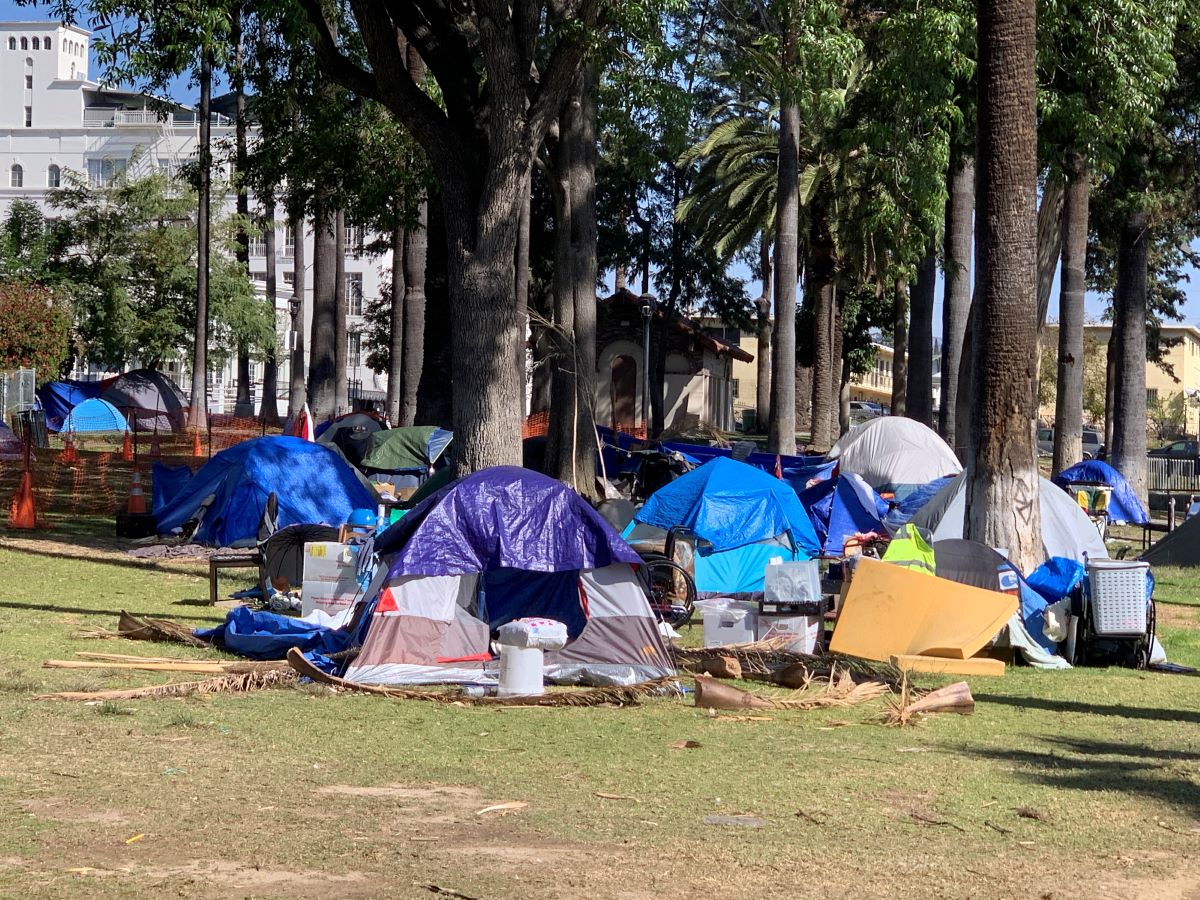This is part one of a three part series about homeless sweeps and the criminalization of homelessness.
As homelessness continues to increase nationwide, adversely affecting millions of people, politicians are progressively pushing for options that criminalize homelessness rather than more effective alternatives.
The question, of course, is why. Studies show that criminalizing homelessness is ineffective and expensive, costing taxpayers triple the price they would pay to permanently house these same vulnerable individuals.
The answer, tragically, is corruption. It’s corporate greed packaged in catchy internet slogans that feign compassion but, in reality, promote something akin to modern-day slavery. The dirty truth about homeless encampment cleanups is that they are a clever way to fill for-profit prisons with poverty-stricken, non-violent offenders.
The fact that they are growing in popularity is neither happenstance nor coincidence. It is an orchestrated plan devised in part by the conservative think tank The Cicero Institute. Unsurprisingly, it is a firm headed by a billionaire heavily invested in the prison industrial complex.
The underworld of Cicero Institute lobbyists who push for sanctioned temporary encampments is publicly accessible but veiled in deception. Their website is littered with buzzwords that sound well-intended. But make no mistakes about it – their goal is not to house but to imprison.
Scarier still, more and more politicians are supporting them in the corrupt endeavor to line the pockets of the rich at the expense of America’s poorest citizens.
Homeless Criminalization is More Frequently Being Used Over Housing First Solutions
If you’ve noticed a shift in homeless sector politics, it’s not your imagination. The Housing First Model, which is statistically proven to be the most effective and least expensive approach to homelessness, has taken a back seat to alternative campaigns. Many of these campaigns are wrought with homeless criminalization – policies that punitively punish people enduring homelessness for the perceived “crime” of existing in public spaces.
To shed some insight into how drastic the data is, according to the National Low Income Housing Coalition, urban camping ordinances have increased by 92% since 2006. Meanwhile, bans on vehicular residency are up a whopping 213%.
Both of these are examples of anti-homeless legislation, sets of laws that make it illegal for homeless people to engage in life-sustaining activities such as:
- Walking
- Sitting
- Standing
- Lying down
Homeless Sweeps are Sweeping the Nation
Perhaps, the most notorious example of homeless criminalization is what’s known as an “encampment cleanup” or “sweep.”
Sweeps occur when law enforcement officials use anti-camping bans and the like to evict people from large tent encampments in heavily trafficked sections of cities. When a city conducts a homeless sweep, they seldom place any encampment residents into permanent housing, although they imply this action to the general public through deceitful language.
What really happens is that people enduring the horrors of unsheltered homelessness are further exploited by being hauled off to prison, saddled with hefty fines and court fees, and robbed of their few remaining possessions.
In the aftermath of these punitive actions, most encampment residents wind up back on the streets in days, worse off than before. Meanwhile, cities experience financial setbacks well into the millions as encampment sweeps cost more than $5 million a pop. They also don’t make the homeless problem disappear even when they successfully shift it a few streets over.
Given the facts, it’s difficult to understand why politicians lobby for sweeps or sanctioned encampments. It’s even harder to figure out why the public would support the movement.
According to one expert from the National Homelessness Law Center, the complex answer could be a bipartisan subscription to the bootstrap mentality.
Will Knight, Decriminalization Director for the National Homelessness Law Center, Says the Cicero Institute is 100% Behind the Recent Legislative Push Toward Homeless Criminalization
In an exclusive interview with Invisible People, former Civil Rights Attorney, and current Decriminalization Director for the National Homelessness Law Center, Will Knight, explained the predicament with the following quotes.
“The Cicero Institute was founded by billionaire Joe Lonsdale and other interested groups that are affiliated with him, with Prager University, which holds a very capitalistic conception of what I’m calling poverty profiteering. Under the auspices of data and research and fiscal responsibility, the Cicero Institute is selling one size fits all, quick-fix solutions to deeply ingrained social problems by profiting off of the very people who are being harmed. This is happening in a way that is making the problems demonstrably worse.”
When asked if he believed the Cicero Institute was responsible for the recent shift in legislation as states such as Tennessee, Missouri, Texas, Georgia, and more turn to adaptations of the Cicero model for penalizing homelessness, he responded, “100%.”
“Homelessness is not a symptom of moral failings,” Knight continued. “It’s not a symptom of mental illness issues. It’s not a symptom of substance use issues. Homelessness is directly caused by a lack of affordable housing.”
“It is an economic issue. You can draw a straight line from the 1980s when the conservative side of our politics under the Reagan era defunded HUD, and that began the modern conception of homelessness. We’ve had epidemics of homelessness in the past – always linked to economic turmoil and unavailability of affordable housing – but never like this.”
“It’s been growing and growing as our society has become more and more averse to human sympathy for those struggling with economic inequality. There lies this sort of nimby or, lift yourself up by your bootstraps, kind of mentality that many of us have become enamored with.”
In terms of the bootstrap mentality that once engulfed only the conservative side of the conversation, Knight believes it has crept into the hearts of many at this point, becoming a bipartisan issue.
“It’s on both sides of the spectrum at this point,” he said. “It’s bipartisan that we expect everyone, no matter what’s happening to them, no matter how many systemic barriers have affected their ability to stand on their own two feet economically, to be personally responsible for factors far beyond their control. The Cicero Institute is a clear manifestation of that.”
Knight States that Cicero’s Sanctioned Encampments Have a Sinister Motive of Funneling Money for Capital Interests
“The sanctioned encampments are a part of Cicero’s model legislation which is publicly available on the internet. It is part of that model legislation that’s been proffered in many jurisdictions across the country. It’s been passed in one or two places but defeated in most places so far. But it’s clear that the idea is coming from the Cicero Institute, just literally based on the language of their proposed model legislation.”
“The sanctioned encampments are also tied to another aspect of it that requires our government to restrict all expenditures on housing, including those provided by the federal government, so state and federal funds can only be spent on those sanctioned encampments.”
They are providing a sort of business solution for those sanctioned encampments. This consists of partnering with things like pallet shelters, tiny homes, and one-size-fits-all solutions that are corporate for-profit businesses in the first place.
All in all, it’s an effort to co-opt money that we have set aside through the government to help people in need and funnel that money toward capitalist interests.
Talk to Your Legislators About Passing Laws that Decriminalize Homelessness and Make Housing a Human Right
Unfortunately, for politicians and predatory business people, there is a great deal of financial incentive in pushing sanctioned encampments, homeless arrests, and other punitive measures found in the Cicero model.
Fortunately for our neighbors without walls, studies suggest that most politicians want to leave the decision up to you. The vast majority of surveyed city leaders admit that their biggest concern in addressing homelessness is not solving the crisis but appeasing the voters. Make sure they know your vote is contingent upon making housing a human right.
Stay tuned for part two in this series.












